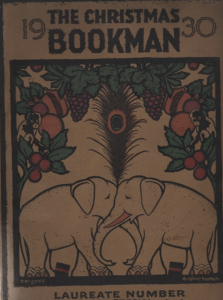Found in the Christmas 1930 issue of The Bookmanis the following account by Thurston Hopkins of some famous men’s responses to his questions about the books they recall reading in childhood. There is even a facsimile of a fragment of the letter Shaw sent to Hopkins dated 29th December 1929.
In an introduction to his survey Hopkins regrets the passing of the ‘ mainstays ‘ of popular children’s literature—Robinson Crusoe and Hans Christian Anderson’s Tales—in favour of thrillers and mystery stories. Luckily, some of the old favourites do feature in the choices made by these eminent men.
Rudyard Kipling
Mr Kipling was probably born with a taste for curious and out-of-the-way books. At fourteen he was in the editor’s chair of the United Services College Chronicle, and was allowed the run of the head master’s study—-that ‘brown-bound, tobacco-scented library’ that he speaks of with such reverence in his chronicles of school boy life. Kipling stolidly read his way through the whole library. There were many of the ancient dramatists, a set of the ‘ Voyages of Hakluyt’, a literary treasure which do doubt supplied Kipling with much information that he makes us of in his later books; French translations of the Muscovite authors, Pushkin and Lermontoff; the ‘ Rubaiyat of Omar Khayyam’, afterwards parodied by him in ‘Departmental Ditties ‘; there were volumes of Crashaw, Dryden, Alexander Smith, L.E.L., Lydia Sigourney, Fletcher’s Purple Island, Donne. Marlowe’s Faust, Ossian, ‘The Earthly Paradise’, ‘Atlanta in Calydon’ and Rossetti.
The books in Kipling’s childhood serve to give some idea of how he obtained the marvellous mastery of detail and that astonish grasp of life in all its phases which make him well nigh wizard among writers before he was out of his teens.
Mr Bernard Shaw
…It has often been said that Shaw was born a greybeard. In all the attempted memories of those who knew him in his childhood there is a note of hesitation, a hint that he was not the ordinary light-hearted boy of common daily life. In a homely phrase, “ people didn’t know what to make of him “ , and to this day nobody knows what to make of him. Thus it will not come as a surprise to discover that the books which usually catch the fancy of boys and girls inspire in him no enthusiasm. Shaw says bluntly that he loathed and despised children’s books from the accursed “ Swiss Family Robinson “ onwards. “ I loathed them “, he writes, “ for their dishonesty, their hypocrisy, their sickly immorality and their damnable dullness. Even as a child, my moral sense, like my penetrating literary judgement , was sound. I have no more recollection of my first book than I have of my first meal. I read everything that came my way, but I had to be encouraged by my mother to persevere at “ Robinson Crusoe “ until we landed on the desert island, after which he carried me with him unaided. I acquired a very boyish ( not childish) taste for Shakespeare from the snippets printed beneath Selous’s illustrations.”
Shaw names “ The Arabian Nights “ and “ The Pilgrim’s Progress “ as the two literary sensations of his childhood; he read them and found in them the note of genius.
“This shows”, he remarks “ that I was as good a critic in my infancy as I am now, though I could not then bring such brilliant reasoning to support my opinion.”
Two poems made a profound impression on Shaw as a child; he admits that he was born with an uncanny knowledge of the “ Ancient Mariner” and “ John Gilpin ; as also with an unaccountable recollection of Baron Trenck and his escapes from prison.
Mr Charles Blake Cochran ( the well known theatre manager and impresario)
Mr Charles Blake Cochrane thinks the right boy can tell the right book the moment he strikes it…Mr Cochrane’s favourite was “Treasure Island” by Robert Louis Stevenson. The proof to him that it was “his “ book was not that it has never been forgotten, but knowing that reading the first few pages that he could never forget it.
“ I have often wondered “, said Mr Cochran, “ what book I should choose if it was my fate to be marooned on some desert island for the rest of my life, with the choice of one single volume for a companion. It would be very difficult to make a choice, but I think that Shakespeare’s ‘ Plays and Sonnets’ would be the book for me”.
Your Jotter wonders whether Roy Plomley derived his idea of ‘Desert Island Discs’, which dated from 1941, from Mr Cochran’s vision of being marooned on a desert island with one book as a companion. Plomley would have been a 16-year old schoolboy when this issue of The Bookmanappeared, but the notion is not so far-fetched. [R.M.Healey]

